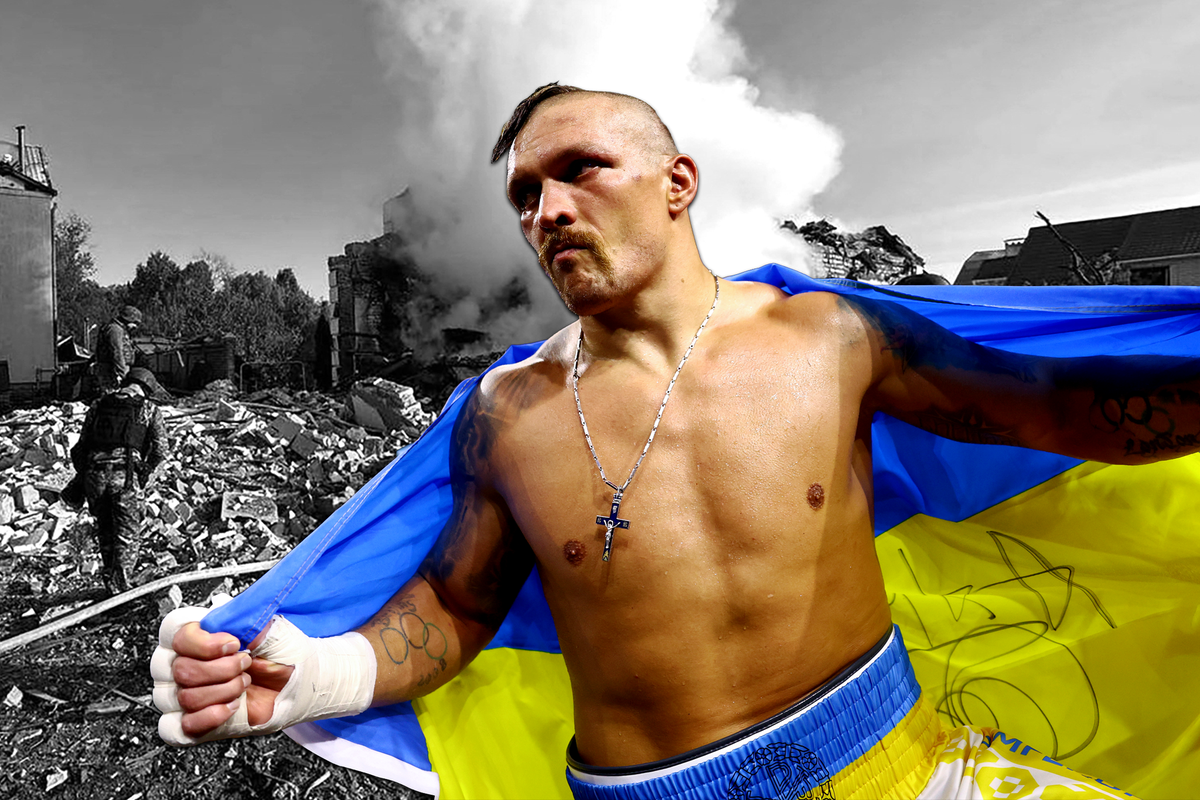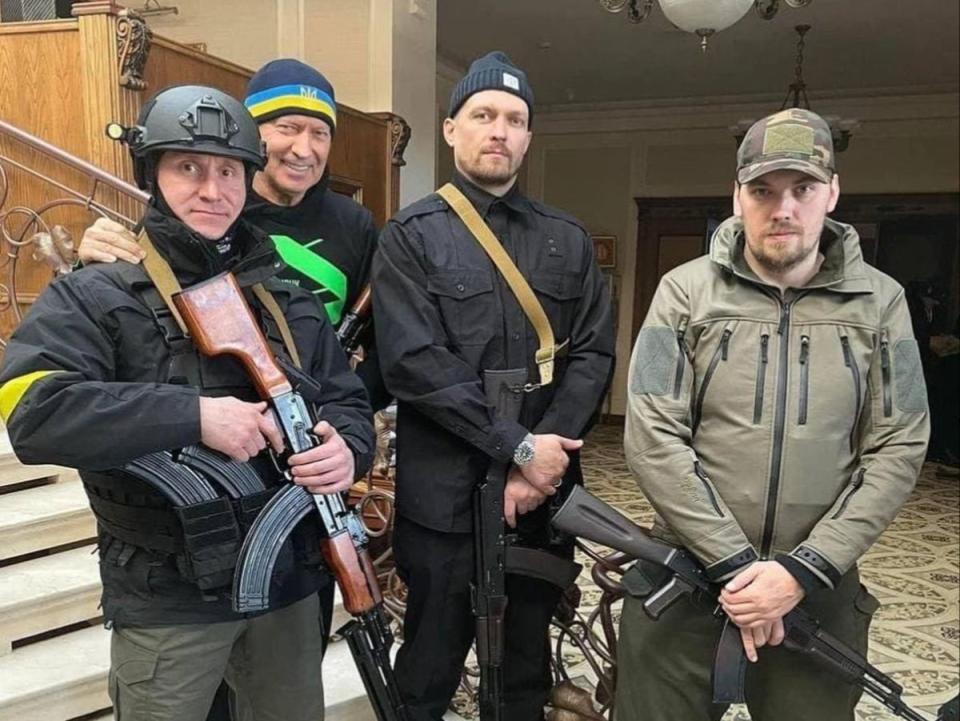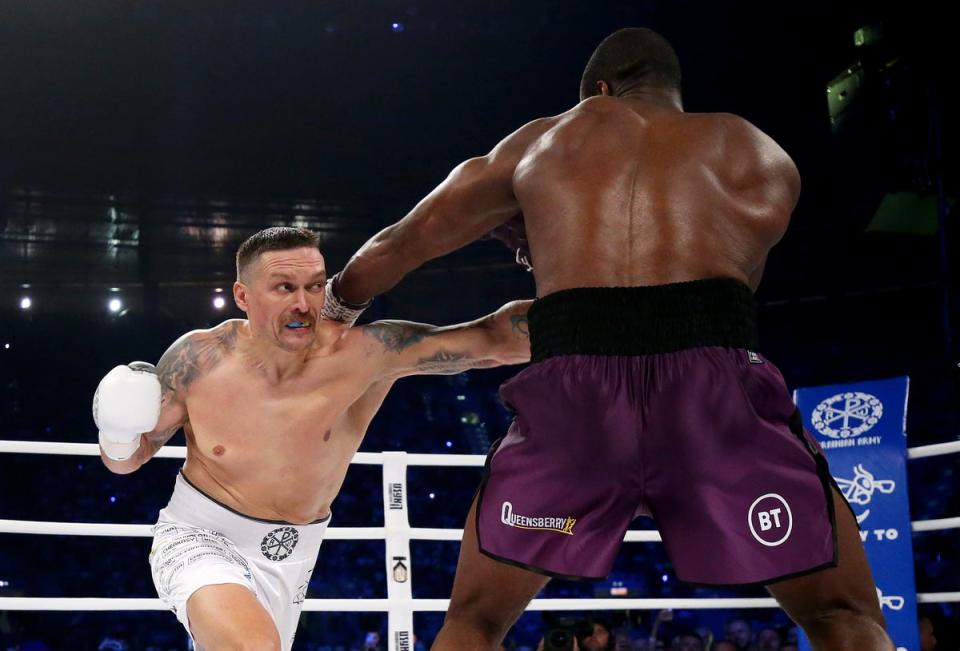How Ukraine’s war changed Oleksandr Usyk – and how it didn’t

As Oleksandr Usyk heard the words “and still”, he winced more than he had done under the impact of any of Anthony Joshua’s punches. While the Ukrainian’s heavy left hand was raised by the referee, his face contorted as he tried to trap the swell of tears. With his right, the world heavyweight champion reached over his head and hoisted his nation’s flag above his shoulders then dragged it down over his face – wishing to hide, for just one brief moment.
Moments later, in the refuge of his locker room in the Jeddah Superdome, an emotional Usyk was welcomed by messages from a unique set of friends and fans. “He received videos from the soldiers deep in the ground on the battlefield, who were watching his fight live on smartphones,” Usyk’s promoter and compatriot Alex Krassyuk tells The Independent, referencing their countrymen who were fighting Vladimir Putin’s Russian forces in Ukraine. “The guys on the frontline, they were sending Usyk words of support. This is something that cannot be expressed in words; the spirit he gives is motivation for the guys who are battling for the light. He is giving them incentive to live, fight for their homeland, struggle for freedom.”
Several months earlier, Usyk was standing with these very men, after Russia’s 2022 invasion of Ukraine marked the latest and most significant development in a conflict that can be traced back to 2014. Usyk, urged by the soldiers he had served alongside, eventually left the frontline in Kyiv to return to his usual battlefield: the boxing ring, to begin training for a rematch with Joshua.
The 37-year-old’s clinic against the Briton in London, in 2021, was arguably his greatest triumph yet – in a career that had already seen the southpaw claim Olympic gold in the same city, before he became the first undisputed cruiserweight champion of the four-belt era. This rematch with Joshua, in Saudi Arabia, was more closely fought yet eclipsed Usyk’s first victory over his fellow Olympic champion. Having taken the unified heavyweight belts from “AJ” in their first meeting, this time Usyk retained the titles after surviving a late scare. Somehow, following a round in which he was at risk of being finished, Usyk reasserted his superiority, aggressively outboxing a bewildered Joshua. The Briton’s post-fight, in-ring meltdown conveyed the depth of his disorientation.
This August 2022 rematch, thanks to Usyk’s campaigning, was shown on free-to-air TV and YouTube in Ukraine, intended as a brief distraction from Russia’s onslaught. While the same set-up will not be in place on Saturday, Usyk’s long-awaited clash with Tyson Fury is likely to engender the same nationwide sentiment in Ukraine; the bout in Riyadh, to crown the first undisputed heavyweight champion in 24 years, will be a fleeting but welcome interruption to a ghastly routine in the under-siege country.
“[The reaction] will be something you can’t imagine, because Ukraine now is deep in war, deep in depression,” Krassyuk says over the phone, one week before Usyk and Fury defend their world titles and unbeaten records. “Every day, Russia attacks Ukraine with missiles, rockets, all kinds of weapons. For people who are depressed by all this, it will be a breath of fresh air when their compatriot – the guy who stands for Ukraine, helps Ukraine as much as he can – wins the crown of all the divisions. It will make him the most successful athlete in the history of boxing. God help him in the upcoming battle of his life.”
As Krassyuk says, Usyk has done what he can to aid his nation amid the ongoing conflict, establishing a charity to help victims of the war and, in a much different form of support, even wielding weapons.
“Every day I was on patrol, I would pray to the Lord: ‘Please don’t let anybody try to kill me,’” Usyk said in June 2022. “But also, ‘Please, God, don’t let me have to shoot any other human being,’ which I knew I would have to do if I felt any danger, or that my family’s lives were in jeopardy. It took me only one day of war to understand completely that everything I have, I can lose it all in just one second.”
That might never have felt more real than when Russian soldiers broke into Usyk’s house. “They did damage to create living space and stayed there for some days,” he recalled. In that moment, Usyk was more relatable than ever to his compatriots.

“As a man who is originally from a very simple neighbourhood and common family, he reached the highest heights just from hard work, patience, being goal-oriented and a very faithful and trustful person,” Krassyuk says. “I admire him like normal fans do. He has become a national hero, an example for new generations.”
It is a sentiment echoed by Tatiana Strelchuk, a Ukrainian barber in London. “We all know him very well, 100 per cent, as he fights for Ukraine and always shows that we are a decent country,” she says. “Ukrainians are the most powerful people, I’m very proud to be Ukrainian, and Usyk is the best of the best. I can’t wait to watch [Usyk vs Fury], I think everyone will watch. I was thinking of going to Saudi, too.”
Olena Skachko, a Ukrainian journalist based in London, concurs. “Usyk is an extraordinary figure. It is hard for me to define his exact place in people’s hearts, as I have friends who love sports and live by it, but other people’s attitudes are different... but Usyk is a national treasure for the country.
“And in my opinion, in light of current events, it is more important than ever to show Ukraine in a positive light, showing victories and significant achievements. It is important to cheer for our people. Ukrainians have to live their lives and carry on, even amid the risk of being killed.”
Usyk and Krassyuk have also carried on, in their own way, with the southpaw most recently fighting in August, when he stopped Daniel Dubois in front of thousands of Ukrainians in Poland.

Yet Krassyuk admits: “I can’t say I ‘managed’. I’m still in this, but when you are stuck in some circumstances, you make a choice. Either you sit and wait to get depressed, or you keep living. You keep doing things you used to do, putting goals in front of you, achieving results. Life goes on, unless the Lord decides otherwise. For Ukraine as well: Whatever happens, it happens for a reason.
“We have to be strong, we have to stand it, we have to overcome it. Whatever doesn’t kill us makes us stronger. Deep in his heart, Usyk remains the same: the same man with all those extremely valuable human characteristics. No obstacles or hardships changed him for the worse.”
Yet Usyk has changed in other ways, as Krasyuk sees it.
“Before, he was a wise man. After the war started, he became an extremely wise man. He is a guy who keeps reading books instead of browsing the internet, he is a real family man – a great father, husband, son – and a patriot.”
For some Ukrainians, however, that final note requires an asterisk. Usyk was born in the Crimean city of Simferopol in 1987, when the peninsula was still part of the Soviet Union. Since Russia’s war with Ukraine began in 2014, and Russian president Putin annexed Crimea (officially part of Ukraine at the time), Usyk has frequently been questioned over the peninsula’s ownership.
After years of downplaying the question, Usyk ultimately answered: “Crimea belongs to God.”

Skachko highlights the moment as one in which perceptions of Usyk changed in some of his compatriots, who wanted a more pro-Ukraine answer. Yet Vladimir Konstantinov, a Crimean-Russian politician, wanted a more pro-Russian answer. As such, Usyk was stripped of the titles awarded to him by Crimea.
“When he said, ‘Crimea belongs to God,’ it was probably the 10th or 15th time he was asked the question,” Krassyuk explains. “The first time he was asked, he’d had just two fights, and it was an interview where he was wearing the yellow and blue tracksuit and had the traditional Ukrainian haircut. There was no hesitation with his answer. Then we had a press conference where he was asked the same question, and he said it again and again.
“In 2016, we had another press conference, and a TV station showed up to ask only one question. Usyk was so frustrated and tired of answering, so he said: ‘I’m not a parrot. I told it once. If your memory is weak, just watch the video. But still they tried, so he said: ‘It belongs to God, as everything around us belongs to him.’ That was his diplomatic answer.
“But trust me, this man is a real patriot, a real citizen of Ukraine. He loves Ukraine, he has Ukraine in his heart. The Ukrainian coat of arms is the trident, and as he used to say: The trident is tattooed on his heart.”
Usyk will wield no trident when he shares a ring with Fury, just the same two weapons that made him a national hero long before he picked up a gun for Ukraine. As missiles rain down, somehow a country at war will pause momentarily, watching Usyk throw hands as if Ukrainian lives depend on it.
The Usyk Foundation has launched a fundraiser to purchase 50 ambulances in support of Ukraine. The foundation will raffle off three pairs of boxing gloves signed by Oleksandr Usyk and an exclusive collector’s box from the night of Usyk vs Fury. For every 5 USD/EUR/GBP donation, donors will receive one ticket; the more tickets they acquire, the greater their chances of winning. The donor who contributes the most will receive a box containing a tracksuit and a T-shirt signed by Usyk.You can participate here. The campaign will continue until 18 May (10pm BST).


